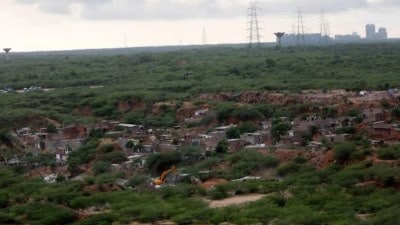Food packets to discarded posters: BMC removes 1 lakh kg waste from Azad Maidan
Besides this, the BMC’s data show that 466 sanitation workers were deployed by the authorities during this period for clearing the piles of waste.
 The overall waste removed is equal to the full capacity of 54 waste compactor dumpers each having a capacity of 1,850 kg each, that were pressed into operation for collection and transporting the accumulated solid waste.
The overall waste removed is equal to the full capacity of 54 waste compactor dumpers each having a capacity of 1,850 kg each, that were pressed into operation for collection and transporting the accumulated solid waste. From food packets to plastic bottles, chappals to discarded flyers and posters, the Brihanmumbai Municipal Corporation (BMC) removed 1.01 lakh kg or 101 Metric Tonnes (MT) of waste items from Azad Maidan and its adjoining areas between August 29 and Tuesday morning while protest against the Maratha reservation was underway.
The overall waste removed is equal to the full capacity of 54 waste compactor dumpers each having a capacity of 1,850 kg each, that were pressed into operation for collection and transporting the accumulated solid waste.
According to the BMC’s data, on August 29, around 4,000 kg of waste was removed by the civic authorities from the Azad Maidan area, later on August 30, 7000 kg of waste was removed.
Meanwhile a total of 30,000 kg waste each was removed on the days between August 31 and Tuesday morning.
Besides this, the BMC’s data show that 466 sanitation workers were deployed by the authorities during this period for clearing the piles of waste.
“The sanitation workers who mainly comprised waste pickers and sweepers were being deployed at work on a shift basis. Besides this, we had deployed 13 small compactor vehicles having a maximum capacity to carry 1,850 kg of waste along with three large compactor vans with a capacity of 12,000 kg,” a civic official told the Indian Express.
The BMC’s data furthermore shows that 26,000 litres of water were used by BMC to clean the roads of Mumbai during this period. The civic authorities had deployed 26 tankers, each having a capacity of 1,000 litres.
The BMC’s data also show that the authorities as a precautionary measure had used 1,050 kg of bleaching powder and 100 kg of izol powder as disinfectants during the aforementioned period.
“The cleanliness drive couldn’t be carried out in a consistent manner since a large number of people had gathered at the spot and several areas were inaccessible for us. Therefore the drive got hampered multiple times,” an official told the Indian Express.
“We had deployed a large number of small compactor vehicles (SCV) each having a capacity of 1,850 kg, since they can manoeuvre through crowded places easily. Once they are full, the waste would be transported to the refuse transfer stations (RTS) at Mahalaxmi, and from there it would be sent either to Deonar dumpsite or Kanjurmarg facility” said the civic official.
Civic officials said that a large chunk of the solid waste that were recovered from the spot comprised inorganic waste items like plastic waste including bottles and food packets. The officials also maintained that they had recovered hazardous corrosive items like paints and batteries as well from the Azad Maidan.
Night-long operation after court order
After the Bombay High Court (HC) on Monday ordered the protesters to disperse from the public spaces, the civic authorities initiated a night-long cleaning operation. The Mumbai Fire Brigade (MFB) had set up 40 high-intensity towers to illuminate the Azad Maidan area during the intervening night of September 1 and 2.
Civic officials also stated that during this period, the authorities had also deployed 1,000 sanitation workers to clean up the streets of Mumbai. A total of 500 KG plastic bags were also handed over to the sanitation workers for clearing the accumulated waste.
“After the roads were comparatively empty, we loaded the waste into the dumpers. At a time 2-3 mini dumpers were loaded which would transfer the waste into a large dumper, which would later transport the waste to the refuse transfer stations for further processing,” a civic official said.
During this period, the BMC had also deployed four waste suction and jetting machines for clearing and washing the roads of Mumbai.
The BMC had set up nearly 140 toilet seats for the convenience of the protesters, which includes 81 mobile toilet seats and 61 permanent seats that were already in place at the Azad Maidan premises.
“Out of the mobile toilets that were used, 15 were installed at MG Road, 10 were installed at High Court (HC) and 12 around DN Road,” the official said.







